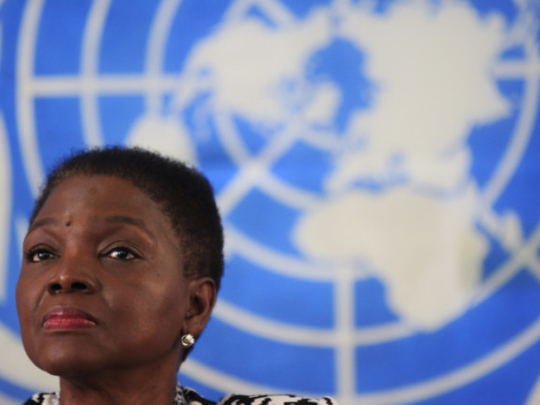
Dubai: UN Humanitarian chief Valerie Amos — on the eve of the second round of Geneva 2 negotiations which kicks off on Monday — said the first round of peace talks failed to find a solution to the desperate relief effort in Syria.
UN-Arab League Special Envoy Lakhdar Brahimi, who was a mediator at the talks, claimed he had “observed a little bit of common ground; perhaps more than the two sides realise or recognise.” But the two sides had agreed on nothing of substance; a reality which concerns Amos.
“I am deeply disappointed that the Geneva 2 talks concluded without agreement on humanitarian pauses to bring relief to hundreds of thousands of people blockaded in towns and cities in Syria,” she told Gulf News in an exclusive interview.
“I am extremely concerned that while the discussions continue to try and find a political solution to end the crisis, ordinary men, women and children are dying needlessly across the country and others are desperate for want of food, clean water or medical care.”
Separately, in a statement to Syrian state news media, Faisal Mekdad, the deputy foreign minister, said that the government’s delegation would return to Geneva for the resumption of talks with the exile opposition on Monday.
The first round of the talks, which are backed by the United Nations and a number of countries including the United States and Russia, concluded last week without tangible progress towards stopping the war that has killed more than 130,000 people and created millions of refugees. The United States and the opposition coalition insist that the goal of the talks is to get the sides to agree on the members of a “transitional governing body” to run the country, as is called for in the UN communique outlining the talks.
The Syrian government, however, has insisted that the talks must focus on fighting terrorism. While Islamists and extremists, including one Al Qaida affiliate, have risen to prominence among the rebel forces inside the country, the government dismisses all resistance to its rule as “terrorism.” In announcing the government’s participation, Mekdad said its delegation was willing to discuss the communique “article by article” and that the talks should seek to “protect the lives of Syrians and stop the bloodshed by the armed terrorist groups and their regional and international supporters.” Officials involved in the talks acknowledge that the possibility of an imminent breakthrough in the talks is low, largely because there are few levers that President Bashar Al Assad’s opponents can use to force his government to surrender power. Al Assad’s military has a firm grip on the capital and much of the country’s centre, while rebel forces lack unity and have become increasingly bogged down in clashes with an extremist group that has grown in their midst.
The Syrian government has also questioned the opposition’s ability to deliver any deal that might be reached. The government says the opposition delegation lacks control over the fighting forces inside Syria and represents only a slice of the anti-Al Assad groups outside the country. Western officials have suggested that getting the parties to talk could lead to other benefits, like local ceasefires or increased access for humanitarian aid.
With inputs from New York Times












